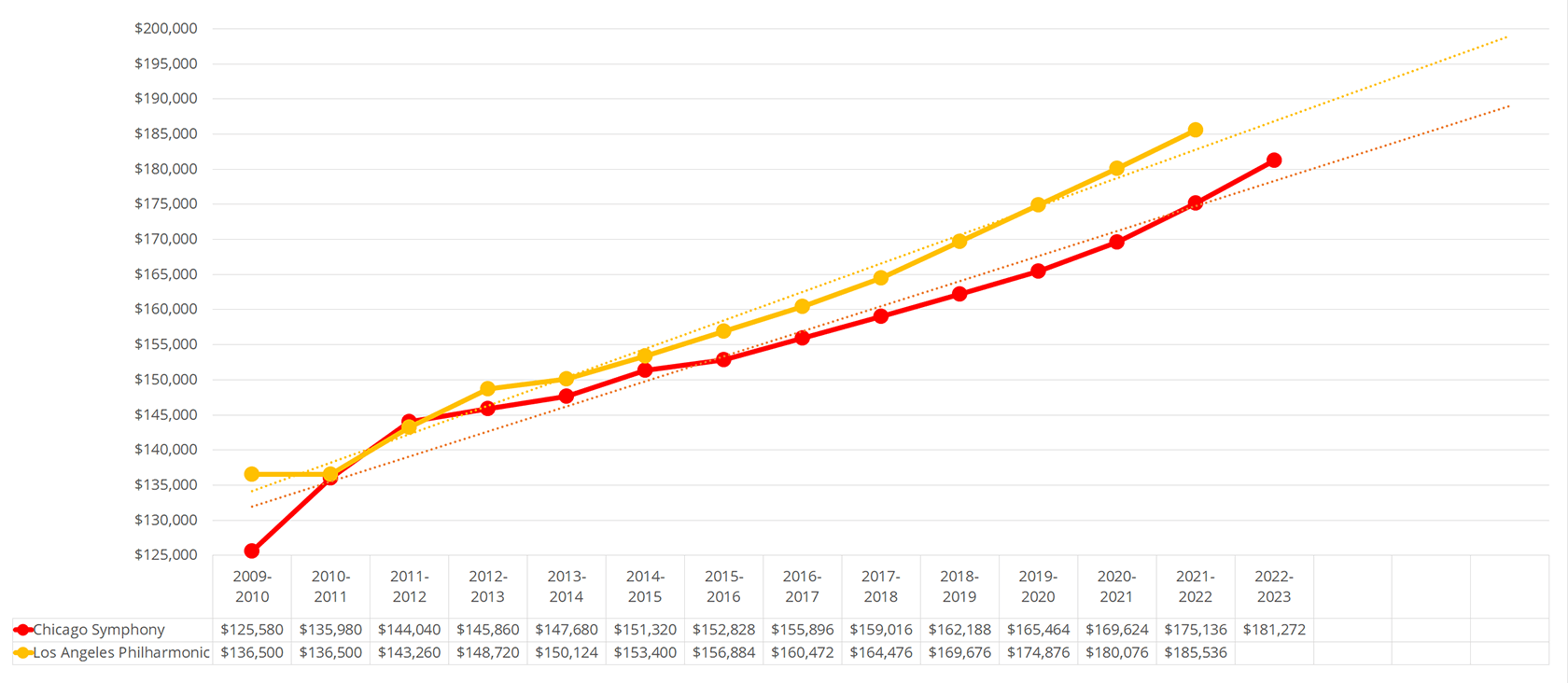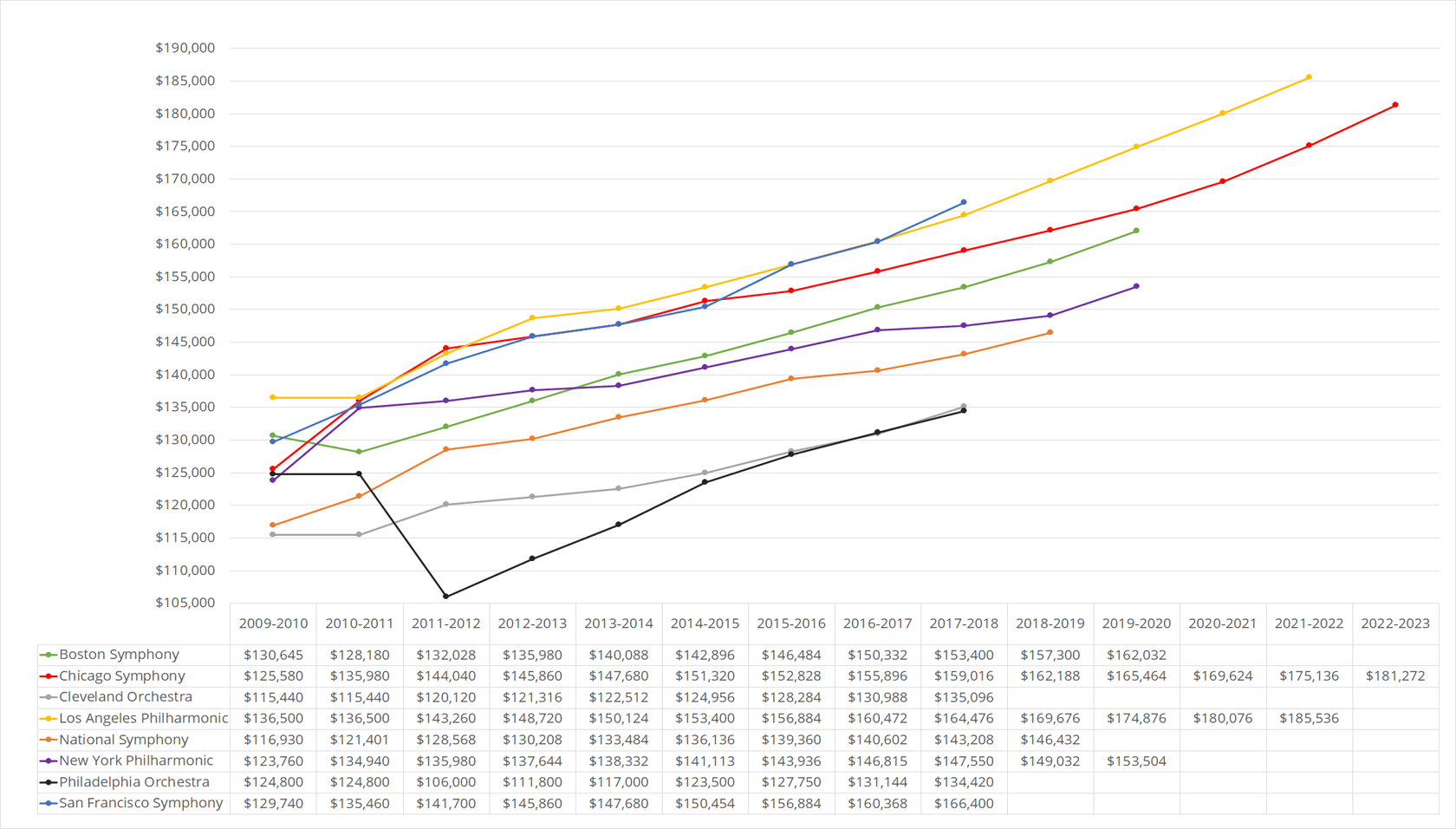On Saturday, 4/27/2019 the board of the Chicago Symphony Orchestra Association (CSOA) and the CSO musicians ratified a new five-year collective bargaining agreement (CBA). The deal was reached shortly after outgoing Chicago Mayor Rahm Emanuel became directly involved. Let’s take a close look at the new terms to see what each stakeholder managed to secure.
Pension
In a nutshell: the employer scored a big win on this term while the musicians walked away with nothing meaningful to show on what was the centerpiece of their decision to strike.
Among the items that triggered the work stoppage, the most contentious was the CSOA’s proposal to replace the existing defined benefit (DB) pension plan with a defined contribution (DC) plan that provides lower dollar benefits and shifts the risk to employees.
In the end, the employer secured everything it was after. The result produces a new two-tier pension plan that provides incoming musician employees with a far less equitable retirement plan compared to what existing musician employees will receive.
The only term musicians managed to include past what was proposed in the CSOA’s last, best, and final offer was a condition to conduct a study to determine if there is a way to provide a DC retirement benefit that is comparable with the DB value. Here’s the direct language from that term:
Per CSOA Comprehensive Last Best and Final Offer of April 7, 2019, with the following changes:
- Annual DC contribution by CSOA will be 7.5% of minimum scale.
- Investment Protection Annuity Conversion Feature Index:
Beginning July 1, 2023, solely for the purpose of determining the Investment Protection Annuity Conversion Feature as outlined in the CSOA Comprehensive Last Best and Final Offer dated April 7, 2019, in order to calculate the hypothetical DB benefit that a Member would have earned had the DB plan not been frozen, the annual accrual for July 1, 2023 – June 30, 2024 will be $2,314 and shall be presumed to increase by 1 % (one percent) for each future Plan Year for each Year of Participation earned in that Plan Year (i.e. a “annual accumulated accrual” benefit). A Participant’s hypothetical DB benefit will be equal to the sum of the annual accruals for each Plan Year for which they would have earned a Year of Participation had the DB plan not been frozen.- An independent analysis of the DB pension investments shall be conducted.
- CSOA and CSO representatives shall study options for providing retirement security for musicians hired after the freeze of the DB plan. The joint committee will report on the outcome of their study to the President of the CSOA and the CFM not later than one year after ratification of the Agreement.
While the CSOA agreed to a year long study, there are no assurances that anything in the new two-tier pension structure must change. At best, the study will produce recommendations, but nothing more.
If the musicians are displeased with the report or how the CSOA responds, they won’t be able to leverage any pressure for another four years, when the newly ratified CBA expires.
The musicians have provided what may be best defined as mixed messages with the outcome of new pension terms.
In a press statement from 4/27/2019 announcing the ratification vote, the musicians painted the pension terms in a favorable light, going so far as to “declare victory” in the statement’s title.
Musicians of the Chicago Symphony Orchestra Declare Victory and Vote to Return to Work
The new agreement preserves guaranteed minimum retirement benefits for current musicians and commits the parties to study options for providing retirement security for new hires.
“After about a year of negotiations we are victorious in our efforts by protecting and maintaining our secure retirement and gaining lost ground on our annual salaries,” said Steve Lester, bassist and Chair of the Musicians Negotiating Committee. “The Musicians voted overwhelming for a fair and competitive compensation and retirement benefit plan that will ensure the excellence and sustainability of one of the finest orchestra’s in the world.”
However, in an interview published in the 4/27/2019 edition of the Chicago Tribune, the same musician spokesperson adopted a different approach. One key element from the spokesperson’s comments is his declaration that converting from the DB to the DC plan will have a detrimental impact on artistic quality.
New hires to the CSO will be placed in the new [DC] plan, leaving veteran players and newcomers in differing pension plans. Both sides have agreed to meet during the next year “to figure out a plan that would somehow deal with the question of equitability,” said…Lester.
“What we didn’t get is the accommodation of new hires,” meaning winning retirement benefits for them that are similar to what the veterans have had.
“That is absolutely essential to the quality of the orchestra,” added Lester. “We have a year to explain to our trustees why that is so important. And explain it in an atmosphere that isn’t charged with a strike.”
It’s safe to assume the musicians spent time during the pre-strike negotiations to explain those very points.
Consequently, why anyone should expect a complete reversal in position among the CSOA trustees now that they’ve secured what they define as “create[ing] long-term stability for the organization” is a mystery.
Annual Salary
In a nutshell: the musicians managed to secure a small increase over the CSOA’s last, best, and final offer that maintains internal wage trends, but does not reach their desired goal of parity with the Los Angeles Philharmonic (LA Phil) and San Francisco Symphony (SFS).
While the musicians have never made clear exact dollar amounts for their base musician annual salary demands, they often referenced maintaining parity with their peers in the LA Phil and SFS.
This is one term where the CSO musicians managed to secure a modicum of improvements over the CSOA’s last, best, and final offer.
Last, best, and final offer (% increase and minimum annual salary):
- 18/19: 2.0%, $162,188
- 19/20: 2.0%, $165,464
- 20/21: 2.0%, $168,740
- 21/22: 2.5%, $172,952
- 22/23: 3.0%, $178,152
Ratified Agreement (% increase and minimum annual salary):
- 18/19: 2.0%, $162,188
- 19/20: 2.0%, $165,464
- 20/21: 2.5%, $169,624
- 21/22: 3.25%, $175,136*
- 22/23: 3.5%, $181,272*
*Ancillary payments do not increase in these contract years.
At the time this article was published, the musicians have yet to respond to requests for clarity on what those ancillary payments encompass and/or their respective dollar values. It could include something along the lines of the Electronic Music Guarantee, but in the end, this amount could impact the apples to apples comparison with the LA Phil and SFS.
In his interview with the Tribune, musician representative Stephen Lester was quoted saying the changes in base pay prevents the minimum annual salary gap with LA and SF from growing and once we’ve confirmed the ancillary payment item, we’ll be able to better gauge the accuracy of that statement.
Currently, only the LA Phil has an agreement of similar length to use for comparison. And when using a simple linear trendline extended for three years past the current CSO CBA expiration date, you can see the CSO will need to maintain rates of increases that exceed averages from the past several years.
As of now, there is no indication that the CSOA plans on maintaining that level of growth.
Instead, it is far more likely that the CSO will remain in a closer competitive relationship with the Boston Symphony Orchestra (BSO).
It’s important to point out the above charts only present competitiveness via base musician annual salary. But now that the CSO has adopted a two-tier pension plan where new musicians stand a high degree of likelihood of having a much smaller pension dollar value, overall competitiveness is a very different picture.
Assuming the BSO maintains their existing DB plan, it’s fair to assume they will provide a far superior career compensation package compared to Chicago.
And while we would need to run the numbers to be certain, it wouldn’t be surprising to see the CSO’s closest career compensation package peer to be the New York Philharmonic or even the National Symphony Orchestra.
While the latter two maintain a lower base musician annual salary rate, they do offer a DB pension plan.
Additional “Return To Work” Terms
The CSO musician term sheet provided for the purpose of ratification included the following additional items unique to the work stoppage.
- 2018 Wage increase: the first year wage increase will be retroactive to September 17. 2018, provided the new contract is ratified on or before April 28, 2019. Retroactive payments will be made within 45 days after the strike ends.
- COBRA: Members who applied for COBRA coverage and paid the premium for April shall be reimbursed for the pro rata share of the CSOA ‘s contribution towards the Member’s premium for the period of the benefit monthly beginning on the Members return to work.
- Wages: Members will return to pay status on the first day of work after the contract is ratified and the strike ends.
- Vacation and sick leave accrual will not be adjusted for the period of the strike.
- Members who had a Released Week(s) scheduled during the strike will be given a makeup Released Week(s) between the end or the strike and December 31, 2020. If a Member has not had the full number of contractually required Rotation Weeks between the end of the strike and the end of the 2018-19 Downtown Season, then that Member shall receive their remaining Rotation Weeks between the return to work and December 31. 2020. No Temporary Musicians will [be] hired to satisfy these Release or Rotation Week requirements.
- Pension Service Accrual: will be governed by the Pension Plan, which provides for the accrual of service.
- If a Member is unable to return to work because he/she has accepted temporary work with another orchestra that conflicts with CSO services, the Member will be allowed leave without pay for up to three service weeks immediately following contract ratification and end of the strike.
- All other open proposals are withdrawn.
- All other changes to the new contract will be effective on the first day of work after contract ratification and end of the strike.
Substitute Musician Parity
At the time this article was published, one item that surfaced at the onset of the work stoppage that hasn’t been clearly defined by either stakeholder is substitute musician parity.
Originally, the musicians indicated the CSOA was proposing to pay substitutes less on a per service basis than full time members.
I’ve reached out to press representatives from both sides in the dispute for clarification. As of the time this article was published, only the CSOA has replied.
According to CSOA Communications and Public Relations Officer, Eileen Chambers “per the terms of the new agreement, temporary or substitute musicians will be paid the same as regular musicians.”
Given the sensitivity of this issue, I also asked if any of the contract language related to substitute and temporary musician was changed and if so, what were those changes. At the time this article was published, they had not yet replied.
The musician representatives have not replied to inquires.
We’ll revisit this issue and/or update this article once they’ve responded.
Conclusions
While the musicians have been painting this settlement as a win in their press statements, the actual terms don’t support that position.
As it stands, the statement announcing the successful ratification could be construed as misleading on the outcome of several of their cornerstone issues. The opening paragraphs provide excellent examples:
The Musicians of the Chicago Symphony Orchestra (CSO) voted unanimously today to ratify a new five-year contract that includes a 13.25% increase in salary and protects their guaranteed retirement benefits[1], with no increases to the cost of musician health benefits. The new agreement preserves guaranteed minimum retirement benefits for current musicians[2] and commits the parties to study options for providing retirement security for new hires[3].
“After about a year of negotiations we are victorious in our efforts by protecting and maintaining our secure retirement and gaining lost ground on our annual salaries[4],” said Steve Lester, bassist and Chair of the Musicians Negotiating Committee. “The Musicians voted overwhelming for a fair and competitive compensation and retirement benefit plan that will ensure the excellence and sustainability of one of the finest orchestra’s in the world.[5] “
- While technically accurate, it is misleading in that it fails to distinguish the lower value DC plan for all incoming musicians and potential lost value for current musicians with only a few years of service.
- This is similar smoke and mirrors phrasing.
- While “retirement security” is never clearly defined, the statement fails to acknowledge that the study carries no enforceable actions. Meaning, regardless how the study unfolds or the recommendations it produces, the CSOA is under no obligation to do anything other than acknowledge receipt.
- That’s about as much positive spin as one can pack into a statement considering the musicians’ fell far short of their demand for base musician compensation parity with the LA Phil and SFS.
- This directly contradicts Lester’s statements to the Chicago Tribune. In that article, Lester makes it clear that in order to maintain the quality of the orchestra, the CSO will need equal pension plan benefits for all CSO musicians and that plan needs to be on par with peers in LA, San Francisco, Boston, New York, and National. While it’s not surprising to see the official press statement take a stab at damage control, the actual settlement terms make it near impossible to reconcile credibility.
In the end, the new five-year agreement is a clear win for the employer.
Having said that, it should come as no surprise to see the CSO, as an institution, suffer considerably in the wake of this work stoppage. Both stakeholders engaged in aggressive old-school gaslighting tactics and as the dust settles, they may discover their broader community support is far lower than before the work stoppage.




